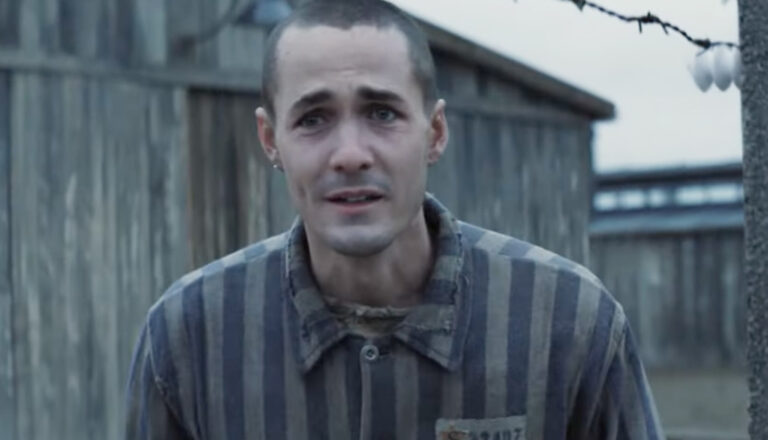
A Man in Full
Talent and intrigue ultimately can’t cloak the truth about this vulgar, crass and graphic drama on Netflix.

The place sounded great on paper.
It was labeled a “transitional center,” an emotional rehab facility designed to help soldiers recover from post-traumatic stress disorder, get them jobs and reintegrate them with civilian society. Homecoming, the place was called—a hopeful name. After all, it was designed to help its patients to, finally, come home.
And some aspects were, indeed, helpful—or so Walter Cruz thought at first. The soldier enjoyed the food there. He participated in the facility’s job training program. He especially liked his counselor, Heidi Bergman, a kind and well-meaning sort who seemed to have the best intentions.
Alas, not everyone connected to Homecoming can say the same. Underneath the job programs and pineapple desserts lies something rotten. And it’s just a matter of time before it starts to stink.
Fast-forward four years. Heidi’s working as a waitress in a diner. She’s not only washed her hands of Homecoming, but seemingly her mind, too. Or so it would seem when Thomas Carrasco, an investigator from the Department of Defense, stops by to ask a question or two.
Were your clients there voluntarily? He asks.
“I don’t know,” she says.
Can you tell me about Walter Cruz?
“I don’t remember.”
Is she sincere? If so, perhaps the flashbacks Amazon has so diligently recorded might jog her memory a bit. She might see how her boss, Colin, pressured her to push Homecoming “clients” through the program quickly. (“What we’re seeking here, Heidi, is information,” he tells her. “Not relationships, not rapport.”) She might remember how focused Colin was on the program’s medication, concocted in a third-world slum. She might’ve recollected why she really left the job—not to take care of her ailing mother, as she told Thomas, but for reasons either unspoken or unknown.
But Heidi apparently hasn’t seen those flashbacks, and neither has Thomas Carrasco. Thomas only knows that when Heidi talked with him, she seemed evasive. And when he called up Walter’s mother, Gloria, to get information from her, Gloria was equally perplexing.
Only one thing’s clear to Thomas: Nothing about Homecoming is clear at all. And even though his bosses suggest he close the case and move on already, he’s not willing to file the folder yet.
Throughout its history, television has often played little sister to the prestige and glamour of the film industry. Sure, TV was popular, and its actors and actresses made plenty of money. Still, Hollywood whispered that to truly be entertainment royalty—to be a real star—you had to be in movies.
Julia Roberts knows all about being a movie star. She’s as synonymous with the silver screen as any actress in recent history. So when Amazon announced that Roberts would be starring in a television show, it cemented a fact that has become more and more apparent over the last several years: TV is no one’s little sister anymore.
Homecoming, based on a podcast by Eli Horowitz and Micah Bloomberg, does give Roberts a chance to play a compelling character in a well-written show. Created in part by Sam Esmail, the mind behind USA’s Emmy-winning Mr. Robot, Homecoming (split into half-hour episodes, rather than the usual hour) is a tightly wound, compulsively engaging mystery—one that’s already prepping for Season Two.
But like the Homecoming facility itself, the show has a darker, seamier side, and it doesn’t bother to hide it.
While sex isn’t much of a focus early on in this taut drama, violence—including soldiers’ horrific experiences overseas and current throwdowns in the facility—is an occasional visitor. Drinking and drugs make their presence known, too. And the show is predicated on dramatic misdeeds (intentional or not) perpetrated by big businesses and governmental bureaucracies.
But Homecoming’s largest issue is its language, with sometimes a dozen or more f-words populating a given half-hour episode.
In April of 2018, Heidi meets with Walter for the first time as she tries to get the Homecoming Transitional Center—set up in a vacant, less-than-ideal office building—up and running. Her slimy boss, though, seems less concerned with the facility’s “guests” than with the data his staff can mine from them, and the drugs he plans to distribute. Four years later, Heidi (now working as a waitress at Fat Morgan’s diner) is questioned by Thomas Carrasco, who received a complaint about the facility and is engaged in some routine follow-up.
In 2018, Walter and another patient at Homecoming punch each other in the face: Walter admits that he shouldn’t have reacted that way, and he confesses to Heidi during a counseling session that he’s had violent ideation at other times—like having the desire to slam his forehead into the pointed edge of his desk.
Heidi’s boss, Colin, is setting up a drug manufacturing facility in some sketchy-looking corner of the third world. (Workers wash unknown but disgusting-looking detritus off of the warehouse tables, and Colin walks out of the plant into an alley filled with down-and-outers as well as a couple questionably-attired women.) He tells Heidi that, now that people are in the facility, they need to be more “discreet” about talking about the medication they’ll be given.
Heidi seems to be cohabitating with a boyfriend whom she’s known for less than a year, and he seems ready to give up his old life for a life with her. She quickly knocks downs a glass of wine when he tells her his plans of to quit his job and move to Tampa to be with her.
We hear the f-word seven times and the s-word three times. We also hear “h—” and “crap.”
Walter begins rooming with another guy at Homecoming named Joseph Shrier, whom he served with in the Army. At dinner, Shrier becomes agitated—speculating that they’re part of an involuntary secret government program. (Program managers move Walter out of Shrier’s room that evening and lock Shrier in his room, not exactly helping to dispel the man’s paranoia.) Meanwhile, four years into the future, Heidi talks to her mother, Ellen, recapping her strange conversation with the investigator, Thomas. When Heidi recalls that she left the job to help Ellen after the latter suffered a fall, Ellen corrects her: Heidi left Homecoming two months before the fall. And when Heidi asks why she came, Ellen shrugs. “You wouldn’t tell me,” she says.
Ellen smokes as the two talk. In the past, we see soldiers at Homecoming who are given unknown pills: Walter dutifully swallows his, but Shrier spits his out of his mouth before eating. When Walter suggests they just take a walk, Shrier snidely says that, sure, they should “get a beer. I’m sure that’ll be fine.”
In the past, Heidi is mystified about why her aquarium fish are dying, until Walter gently tells her that she’s been overfeeding them. Walter recalls when one of his fellow soldiers was killed by an explosive: We see just a quick shot of the soldier’s bloodied glasses. Shrier smashes pineapple cobbler into another diner’s face. In the future, we see in Walter’s file that he was thrown out of the program for “misconduct/violence.”
Walter recalls a funny story of how one soldier was obsessed with the movie Titanic, and how a second soldier told him about a new sequel dubbed Titanic Rising. The supposed sequel featured, according to Walter, “tons of sex,” including Jack’s affair with a teen on board and Rose’s tryst with the captain. The Department of Defense investigator, Thomas, walks in on his boss breastfeeding a child.
We hear 20 f-words, three s-words and one misuse each of God’s and Jesus’ name.


Paul Asay has been part of the Plugged In staff since 2007, watching and reviewing roughly 15 quintillion movies and television shows. He’s written for a number of other publications, too, including Time, The Washington Post and Christianity Today. The author of several books, Paul loves to find spirituality in unexpected places, including popular entertainment, and he loves all things superhero. His vices include James Bond films, Mountain Dew and terrible B-grade movies. He’s married, has two children and a neurotic dog, runs marathons on occasion and hopes to someday own his own tuxedo. Feel free to follow him on Twitter @AsayPaul.

Talent and intrigue ultimately can’t cloak the truth about this vulgar, crass and graphic drama on Netflix.

Tales of the Empire is typical Star Wars fare. But in its exploration of what drives folk to the Dark Side, it can get a bit…darker.

The Tattooist of Auschwitz is a little like its titular character. It’s painful. It gets under your skin. And it just might leave a mark.

The Sonic spinoff blends explosive adventure and road-trip-buddy-comedy into a fun romp for both kids and diehard fans.